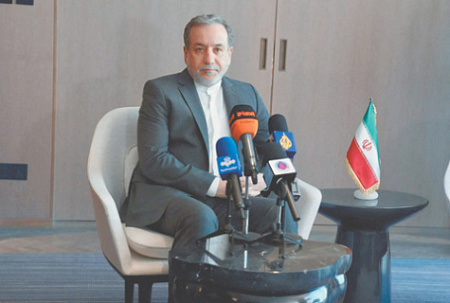
The United States and Iran are starting expert consultations on the technical aspects of the upcoming nuclear deal. They will be held on April 23 and will precede the next round of negotiations in Oman. According to British publications, the participants in the dialogue are now considering the possibility of including Russia in the agreement as a neutral party, which will become not only a receiving point for Iran’s highly enriched uranium reserves, but also a guarantor of the implementation of the agreement. For example, Moscow may commit to returning stocks of radioactive material to Tehran if the deal is broken.
According to the Iranian Foreign Ministry, negotiations with the United States within the framework of expert groups are scheduled to take place on April 23 in Oman with the assistance of intermediaries. The parties are currently working out the technical principles with which they should approach the agreement.
Tehran stresses that it will not abandon its uranium enrichment program for civilian purposes.
At the same time, the Foreign Ministry of the Islamic Republic drew attention to the fact that they are trying to keep abreast of the process of the two main partners – Russia and China, which were among the signatories of the original 2015 nuclear deal, the Joint Comprehensive Plan of Action (JCPOA).
Russia’s role is discussed separately in Oman. As The British The Guardian reported, Washington and Tehran are trying to resolve their differences on two of the most difficult issues – the fate of Iran’s highly enriched uranium reserves and a mechanism that would guarantee compensation to Tehran if subsequent administrations of the US president break the agreement again. Iran considers the issue of maintaining its civilian enrichment program resolved. The special representative of the US president, Steven Witkoff, guaranteed that Tehran would be allowed to keep it at a minimum level, the newspaper writes. And his previous statements about the complete dismantling of the nuclear infrastructure were a game for an internal audience.
Despite the fact that Iran is trying to ensure that it is allowed to keep reserves of uranium enriched to levels of 20 and 60% on its territory, the United States rejects this and demands either the complete destruction of the reserves or their transfer to a third country, such as Russia, The Guardian shares. But this is not the only role that Moscow may get under a potential agreement. Tehran is worried that one of the future administrations of the US president will again break the agreement and leave it with nothing. In this regard, according to the British edition, a compromise option is being discussed – to grant the Russian side the authority to return the exported stocks of highly enriched uranium to Tehran in the event of the collapse of the agreement.
Such a scenario provides Russia with a key role in future relations between the United States and Iran, Western media emphasize. In addition, such a situation would reduce the importance of European players – Germany, France and the United Kingdom, which were also members of the JCPOA and were once one of the most important intermediaries between the United States and Iran. According to some reports, neither Washington nor Tehran want to reserve any place for the UN within the framework of the draft document. In addition, the Iranian authorities believe that the most reliable insurance for a future treaty is its approval by members of the US Congress. However, this option raises many doubts, given the number of pro-Israel influence groups on Capitol Hill.
As diplomatic sources in Israel and Arab countries informed the Financial Times (FT), the Trump administration is not yielding to the lobbying efforts of the Prime Minister of the Jewish state, Benjamin Netanyahu, who is trying to get Washington to take more decisive and tough actions against the Iranian leadership. The FT’s interlocutors are confident that despite the militaristic rhetoric, the Israeli leadership will refrain from independent military action against Iran without the approval of the White House, because it is afraid of angering Trump and losing his direct support. In addition, Netanyahu assumes that Israeli strikes against Iran without the involvement of the American side will have limited impact.
However, the Netanyahu government expects that the US-Iranian negotiations will break down naturally. According to an informed Israel Hayom source, some American officials believe that the Jewish state has nothing to fear: the negotiation process, according to them, is likely to collapse on its own in a few weeks. This, according to the interlocutor of Israel Hayom, will happen after the full range of demands put forward by the United States is presented to the Iranian side. Within this list, Tehran is unlikely to see a noticeable softening of Washington’s position towards the enrichment program and its missile developments, which pose a threat to regional security.
So far, Iran continues to immerse its closest partners in the content of the negotiation process with the United States. On April 22, the Minister of Foreign Affairs of the Islamic Republic, Abbas Araghchi, will pay an official visit to China. “The Foreign Minister recently visited Russia, after which he met with the Italian Foreign Minister on the eve of indirect talks between the Islamic Republic of Iran and the United States,” said Esmail Bagai, an official representative of the Iranian diplomatic department. Now it is the turn to inform Beijing, one of the parties to the JCPOA, which has traditionally approached the issue of Iran’s nuclear program from extremely moderate positions.
